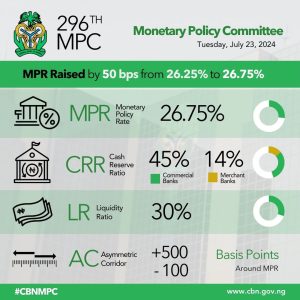In a bold and strategic move, the Central Bank of Nigeria (CBN) has decided to maintain its interest rate at 17%, defying expectations and pressure from various stakeholders. This decision has garnered significant attention, particularly from investors and economic analysts, who view it as a critical step in stabilizing Nigeria’s economy amid global financial uncertainties. This article explores the rationale behind CBN’s decision, its impact on various sectors, and the implications for Nigeria’s economic future.
Understanding CBN’s Decision to Maintain 17% Interest Rate
CBN’s choice to keep the interest rate at 17% stems from a combination of domestic economic concerns and global monetary trends. Central banks worldwide have adjusted interest rates to manage inflation and stimulate economic growth. In Nigeria’s context, the high interest rate aims to balance inflationary pressures, support the naira, and stabilize the financial environment.
Why Is the 17% Rate Significant?
Interest rates serve as a powerful tool for economic management. The 17% rate set by CBN ranks among the highest globally and reflects Nigeria’s unique economic challenges, including high inflation rates, currency volatility, and fiscal constraints. Although this rate may appear prohibitive, it serves several strategic purposes:
- Taming Inflation: Nigeria faces high inflation driven by factors such as global energy prices and local supply constraints. The 17% interest rate acts as a necessary measure to curb inflation, which currently stands at double-digit levels.
- Currency Stability: CBN prioritizes maintaining the naira’s strength against major foreign currencies. By keeping the interest rate high, CBN seeks to attract foreign investment and discourage capital flight, thereby supporting the naira’s value.
- Balancing Economic Growth: While high-interest rates can slow economic activity by making borrowing more expensive, CBN’s decision reflects a cautious approach aimed at avoiding an overheated economy that could worsen inflationary pressures.
Impact on Key Economic Sectors
Maintaining a 17% interest rate has both immediate and long-term effects across various sectors:
- Business Sector: High-interest rates particularly affect small and medium-sized enterprises (SMEs). Elevated borrowing costs challenge companies in financing expansions, purchasing inventory, or managing cash flow. Larger corporations may also reduce capital expenditure and experience slower productivity growth.
- Banking and Financial Institutions: The banking sector benefits from higher interest rates as they can pass these costs onto loans and credit facilities. Banks typically enjoy improved profit margins in high-interest environments; however, they also face increased risks of loan defaults from businesses and consumers with tight cash flows.
- Consumers and Households: For average consumers, a 17% interest rate results in more expensive credit for personal loans and mortgages. This situation often leads to reduced consumer spending as individuals become more cautious about incurring new debt, potentially slowing overall economic activity and job growth in consumer-driven sectors.
Pressures on CBN to Lower Interest Rates
CBN’s decision to maintain high interest rates has not come without significant external pressures. Both domestic and international stakeholders have raised concerns regarding the restrictive monetary policy’s impact on growth. Nevertheless, CBN’s cautious approach indicates its commitment to controlling inflation and stabilizing the economy rather than succumbing to short-term growth pressures.
Calls from the Business Community
Various business groups and industry associations have urged CBN to consider reducing the interest rate, arguing that high borrowing costs limit expansion opportunities and restrict new investments. For instance, the Manufacturers Association of Nigeria (MAN) has pointed out that elevated interest rates increase production costs, which often transfer to consumers as higher prices, further exacerbating inflation.
International Investors’ Perspective
International investors generally prefer lower interest rates that promote growth; however, for Nigeria, maintaining a delicate balance is crucial. Lowering rates could lead to increased capital outflows and pressure on the naira. Therefore, CBN’s decision signals a commitment to long-term stability over short-term gains.
Comparing CBN’s Approach with Other Central Banks
Globally, central banks have been adjusting interest rates in response to inflationary trends and economic challenges. However, Nigeria’s unique economic landscape necessitates a tailored approach:
- U.S. Federal Reserve: The Federal Reserve has raised rates to combat inflation while remaining cautious about avoiding recession. This strategy somewhat mirrors Nigeria’s policy as CBN aims to control inflation without severely hampering growth.
- European Central Bank (ECB): Similar to Nigeria, the ECB has adopted a conservative approach focused on inflation control. However, Nigeria’s higher inflation rate requires a steeper interest rate for effective management.
By maintaining a 17% rate, CBN aligns itself with global monetary tightening trends while accounting for Nigeria’s specific economic conditions.
Potential Risks and Challenges Ahead
While CBN’s decision to keep the interest rate at 17% aims for macroeconomic stability, it introduces various risks and challenges:
- Risk of Stunted Economic Growth: A prolonged high-interest rate environment can deter investments and hinder economic growth. As businesses hesitate to take on expensive loans, Nigeria may experience slower GDP growth affecting job creation.
- Consumer Hardship: High borrowing costs coupled with inflationary pressures create financial strain for households, potentially increasing poverty levels.
- Capital Flight and Currency Pressure: Although high-interest rates can attract foreign investment, they may also trigger capital flight if inflation remains uncontrolled, weakening the naira further.
What Lies Ahead for Nigeria’s Monetary Policy?
CBN’s decision clearly demonstrates its commitment to stabilizing the economy through cautious monetary measures. However, future adjustments remain possible based on global and domestic economic trends. Should inflationary pressures ease, CBN might consider lowering rates to encourage growth and investment.In the coming months, analysts will closely monitor Nigeria’s inflation data, economic growth rates, and currency performance to determine whether maintaining a 17% rate continues yielding positive results or if adjustments will become necessary.


